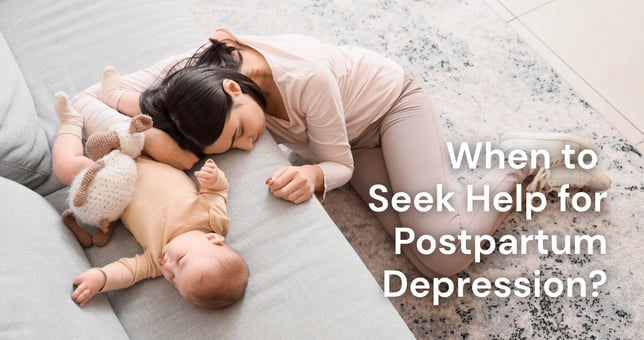When to Seek Help for Postpartum Depression
7/2/20254 min read
Motherhood often arrives with a swirl of emotions - joy, overwhelm, fatigue, tenderness, and uncertainty. It’s common to feel fragile after birth. But when that fragility turns into a persistent emotional weight, many mothers ask themselves quietly: Is this just normal exhaustion? Or is something deeper happening?
Postpartum depression (PPD) is more than just a tough day or a hormonal swing. It’s a real and serious condition that affects approximately 1 in every 7 mothers, and it doesn’t discriminate by background, age, or how deeply someone loves their child. The challenge? Many women don’t know when to reach out for help, or worse, they’re afraid to.
At Peace Temple, we often hear from mothers who waited too long not out of denial, but because they thought they were “supposed” to feel that way. This article will guide you in recognizing when to seek support for PPD, why it matters, and how early intervention can transform your healing.


What Is Postpartum Depression?
PPD is a mood disorder that typically occurs within the first year after childbirth, although it can start during pregnancy or arise months later. It is marked by ongoing feelings of sadness, irritability, hopelessness, or detachment that interfere with daily functioning and the ability to bond with your baby.
Importantly, PPD is not your fault, and it’s not a reflection of how much you care. It is influenced by:
Hormonal fluctuations
Sleep deprivation
Previous mental health history
Birth trauma or complications
Lack of social or partner support
The Difference Between “Baby Blues” and PPD
Many new parents experience the “baby blues” - mood swings, tearfulness, and anxiety that typically resolve within two weeks after birth. These symptoms are caused by hormonal shifts and the immense adjustment to new parenthood.
However, when symptoms:
Last longer than two weeks,
Worsen over time, or
Interfere with your ability to function or care for yourself or your baby…
…it may be postpartum depression—and that’s when help should be sought.
Signs You Shouldn’t Ignore
While everyone experiences PPD differently, here are some common red flags:
Emotional Symptoms:
Persistent sadness, emptiness, or crying
Feeling disconnected from your baby or partner
Loss of interest in activities you used to enjoy
Irritability, anger, or emotional outbursts
Excessive guilt or feelings of worthlessness
Cognitive Symptoms:
Difficulty concentrating or making decisions
Racing thoughts or mental fog
Constant self-criticism or feeling like a “bad mother”
Physical Symptoms:
Exhaustion that doesn’t improve with rest
Changes in appetite or weight
Insomnia or excessive sleeping
Behavioral Symptoms:
Withdrawing from friends or family
Avoiding baby care tasks due to overwhelm or fear
Thoughts of harming yourself or the baby (intrusive thoughts)
If any of these symptoms persist for more than two weeks, or if they escalate quickly, don’t wait - support is available and effective.
When Is the Right Time to Seek Help?
The answer is simple: as soon as you notice something feels off. You do not have to wait until your symptoms are “severe enough.” Early intervention can:
Shorten the duration of depression
Improve bonding with your baby
Prevent escalation into more serious conditions (e.g., anxiety, panic disorders, postpartum psychosis)
Protect your long-term mental health
If you’re unsure whether what you’re experiencing is “normal,” that’s reason enough to speak to a professional. Trust your instincts. You know your body and mind better than anyone.
At Peace Temple, we offer confidential, compassionate screenings and consultations—no pressure, no judgment, just support.
What If You’re Not Sure You’re “Depressed Enough”?
This hesitation is incredibly common. Many mothers minimize their suffering because:
They compare themselves to others
They believe they “should be grateful”
They fear being judged or labelled
They think seeking help means they’ve failed
But here’s the truth: there is no threshold of suffering you must meet before you deserve care. If your mood is interfering with your quality of life or ability to function, even subtly, that’s enough.
And the earlier you intervene, the gentler the recovery process can be.


What to Expect When You Reach Out
When you contact a mental health provider for postpartum concerns, you can expect:
A compassionate discussion of your symptoms and concerns
A safe, private space to share your thoughts and feelings
Recommendations for therapy, support groups, or medication (when appropriate)
At Peace Temple, we use evidence-based approaches like:
Cognitive Behavioral Therapy (CBT) to challenge negative thought patterns
Interpersonal Therapy (IPT) to address changes in relationships and identity
Mindfulness and nervous system regulation tools to ease emotional overwhelm
If needed, we also coordinate care with OB-GYNs or primary physicians to support medical treatment plans.
What If You’re Afraid to Talk About It?
You’re not alone. Many mothers fear that sharing their symptoms might result in judgment or, worse, intervention they don’t want. But in the vast majority of cases, seeking help leads to empathy, not alarm.
You can say:
“I haven’t felt like myself since the baby came, and I don’t know what to do.”
“I’m struggling to connect with my baby, and it’s making me feel awful.”
“I’m not in crisis, but I’m not okay either—and I need someone to talk to.”
These are powerful, honest statements—and a good therapist or provider will hear them with compassion, not criticism.
When Immediate Help Is Needed
If you or someone you love experiences any of the following, seek immediate professional support:
Thoughts of suicide or self-harm
Thoughts of harming the baby (even if you don’t want to act on them)
Severe anxiety or panic attacks
Delusions, hallucinations, or confusion
These could indicate postpartum psychosis, a rare but serious condition that requires urgent intervention.
Emergency mental health hotlines, hospital services, or rapid referrals through clinics like Peace Temple are crucial in these cases.
Final Thoughts: You Deserve to Feel Better
Postpartum depression is not a reflection of who you are - t’s a reflection of what you’re going through. And it’s treatable.
Seeking help isn’t a sign that you’re failing - it’s a sign that you’re brave enough to reclaim your wellness. You deserve to feel supported, connected, and emotionally well - not just for your baby’s sake, but for your own.
At Peace Temple, we believe no parent should suffer in silence. If you’re wondering whether it’s time to reach out the answer is yes.
You matter. And help is here.
